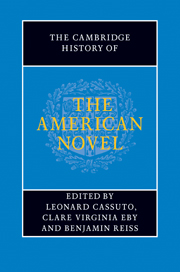Book contents
- Frontmatter
- General Introduction
- PART ONE INVENTING THE AMERICAN NOVEL
- PART TWO REALISM, PROTEST, ACCOMMODATION
- PART THREE MODERNISM AND BEYOND
- PART FOUR CONTEMPORARY FORMATIONS
- Introduction: contemporary formations
- 58 Postmodern novels
- 59 The nonfiction novel
- 60 Disability and the American novel
- 61 Model minorities and the minority model – the neoliberal novel
- 62 The American borderlands novel
- 63 The rise of the Asian American novel
- 64 Toni Morrison and the post-civil rights African American novel
- 65 Hemispheric American novels
- 66 The worlding of the American novel
- 67 The Native American Tradition
- 68 Contemporary ecofiction
- 69 Graphic novels
- 70 Twentieth- and twenty-first-century literary communities
- 71 A history of the future of narrative
- A selected bibliography
- Index
66 - The worlding of the American novel
from PART FOUR - CONTEMPORARY FORMATIONS
Published online by Cambridge University Press: 28 July 2011
- Frontmatter
- General Introduction
- PART ONE INVENTING THE AMERICAN NOVEL
- PART TWO REALISM, PROTEST, ACCOMMODATION
- PART THREE MODERNISM AND BEYOND
- PART FOUR CONTEMPORARY FORMATIONS
- Introduction: contemporary formations
- 58 Postmodern novels
- 59 The nonfiction novel
- 60 Disability and the American novel
- 61 Model minorities and the minority model – the neoliberal novel
- 62 The American borderlands novel
- 63 The rise of the Asian American novel
- 64 Toni Morrison and the post-civil rights African American novel
- 65 Hemispheric American novels
- 66 The worlding of the American novel
- 67 The Native American Tradition
- 68 Contemporary ecofiction
- 69 Graphic novels
- 70 Twentieth- and twenty-first-century literary communities
- 71 A history of the future of narrative
- A selected bibliography
- Index
Summary
It was not a street anymore but a world.
The first sentence of Don DeLillo's Falling Man (2007) describes lower Manhattan in the chaotic minutes after the attack on the World Trade Center on September 11, 2001. But it could also be read as a description of Falling Man itself, and perhaps also of the contemporary American novel in general. So read, the sentence would suggest that the American novel has recently become more worldly, whether because of 9/11 or in response to larger causes that 9/11 stands in for. This proposition is gently self-congratulatory, hence open to doubt. But there are also reasons for taking it seriously.
The street is what most novels take for their subject most of the time. It is by watching society at street level, so to speak, that the novel reader's sense of identity and relationship has mainly been formed. Most novels do not train our eyes to look very high or very low, or for that matter very far away; they do not encourage us to look at superstructures, or infrastructures, or the structuring force of the world capitalist system. There are notable exceptions – some of them discussed in Cecelia Tichi's chapter in this volume – but as a rule, worldliness is not natural to the novel. This does not immediately change after 9/11. Like the protagonist in a suddenly darkened street that has been struck from above and from far away, the post-9/11 novel is first of all disoriented.
- Type
- Chapter
- Information
- The Cambridge History of the American Novel , pp. 1096 - 1106Publisher: Cambridge University PressPrint publication year: 2011
- 34
- Cited by



